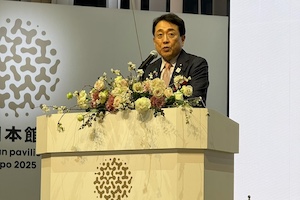Japan and the U.S. Begin Tariff Negotiations; Trump Hopes for Swift Agreement

Japan and the United States began bilateral tariff negotiations on the 16th, led by Japan’s Minister for Economic Revitalization, Ryomasa Akazawa. U.S. President Donald Trump personally met with Akazawa for approximately 50 minutes. Following the meeting, a 75-minute discussion was held with key U.S. cabinet members including Treasury Secretary Scott Besant, Commerce Secretary Robert Lutnick, and U.S. Trade Representative Jamieson Lee Greer. Before departing from Tokyo, Akazawa stated that he would prioritize Japan’s national interests. Trump expressed his desire to reach an agreement with Japan as soon as possible and later posted that the talks had made “significant progress.”
On the 14th, Japanese Prime Minister Shigeru Ishiba publicly stated in the National Diet that Japan is not prepared to make major concessions in the negotiations and is in no rush to reach an agreement. He also ruled out the possibility of imposing retaliatory tariffs on the U.S.—his strongest warning to Washington thus far. Ishiba stressed that the negotiations should not be rushed, warning that "constant compromise" and "hasty settlements" may ultimately lead to failure.
On the afternoon of the 16th (Washington time), Akazawa first met with around 10 representatives from Japanese business circles in the U.S. to exchange views on tariff-related issues and to better understand the challenges faced by Japanese companies operating locally.
On the morning of the 17th, Ishiba stated at the Prime Minister’s Office that both sides had engaged in lengthy, honest, and constructive discussions and would proceed to the next phase. He added that he himself plans to visit the U.S. at "the most appropriate time" to negotiate directly with President Trump. At a press conference following the talks, Akazawa announced that the two sides had reached three points of consensus:
1. Both parties will engage in constructive discussions with the goal of reaching an agreement as soon as possible, to be jointly announced by the two leaders;
2. A schedule adjustment will be made to hold the next round of talks within the month;
3. In addition to ministerial-level discussions, working-level talks will continue as well.
Japan has requested the removal of certain tariff measures, but has not disclosed specific U.S. demands in areas such as automobiles and agriculture, stating only that negotiations are "ongoing." The issue of U.S. military forces stationed in Japan was also on the agenda. While the Trump administration had previously raised concerns over the yen’s exchange rate, this issue was not included in the discussions.
- 312 reads
Human Rights
Fostering a More Humane World: The 28th Eurasian Economic Summi

Conscience, Hope, and Action: Keys to Global Peace and Sustainability

Ringing FOWPAL’s Peace Bell for the World:Nobel Peace Prize Laureates’ Visions and Actions

Protecting the World’s Cultural Diversity for a Sustainable Future

Puppet Show I International Friendship Day 2020

